
Tufts’ cost of attendance reaches record-breaking $92,167 for upcoming academic year
ing and personal expenses such as books and supplies.
senting a 4.7% increase from this past fiscal year.
Tufts’ total cost of attendance has broken the $90,000 barrier for the 2024–2025 academic year, reflecting the rising costs of higher education across the country. For incoming undergraduate students at Tufts, the new price of attendance is approximately $92,167 — a figure that includes tuition, hous-
Tufts will continue to meet 100% of students’ demonstrated financial need, meaning many undergraduates will not actually pay the full “sticker price.” According to James Hurley, vice president for finance and treasurer, the university has earmarked more than $125 million for undergraduate financial aid in the 2025 fiscal year, repre-
“The first thing to understand is, just like with cars, there’s a sticker price and there’s what you pay,” Professor of Economics Jeffrey Zabel explained. “What you pay is much, much less than the sticker price. … It’s very important to understand what the net price is, and that certainly has not been
Tufts accepts 10% of applicants to Class of 2028
Anna Fattaey University
Originally published April 2.
Tufts University accepted 10% of applicants to the undergraduate Class of 2028, the admissions office announced shortly after spring break. This year’s acceptance rate rose just half a percent above the record low acceptance rate set last year, just 9.5%.
Dean of Admissions JT Duck commented on Tufts’ attitude toward acceptance rates.
“We do not focus on what the admit rate of the class will be -rather, we focus on recruiting an outstanding pool of candidates, and then admitting and enrolling a class from that pool that best aligns with the mission of the University,” Duck wrote in an email to the Daily. “Part of that process includes working toward specific enrollment goals by undergraduate school and program.”
This admissions cycle saw over 34,400 applications, which marks a 1% increase over the number of applications seen last year.
This year represents Tufts’ fourth of a six-year test-optional pilot. Despite this and around half of all applicants opting to submit test scores, 60% of accepted students included scores with their applications. These statistics are consistent with the past three years of test optional admissions.
“We understand that applicants have different access to test preparation, and even to test sites close to home, and that test scores do not always reflect an applicant’s academic potential,” Duck wrote. “Our test optional pilot gives us the opportunity to enroll several cohorts of students, not all of whom submitted scores with their application, and then look at relevant data to determine what role testing should play in

the future of our undergraduate admission process.”
Women make up 56% of accepted students, with men 41% and 3% students who identify as nonbinary, genderqueer or prefer not to specify a gender identity. Women also comprise 50% of the class entering the School of Engineering, which is down from last year’s 52% and the year prior’s 55%.
55% of the class currently attend public high schools or public charter schools, while 92% of students ranked among their high school peers are within the top 10% of their graduating classes.
Admissions accepted more than 150 QuestBridge-affiliated students to the Class of 2028, including 30 students through the QuestBridge National Match process. Having ranked their preference of partnered universities, these 30 students were chosen by Tufts to attend with a full-ride scholarship offered through the



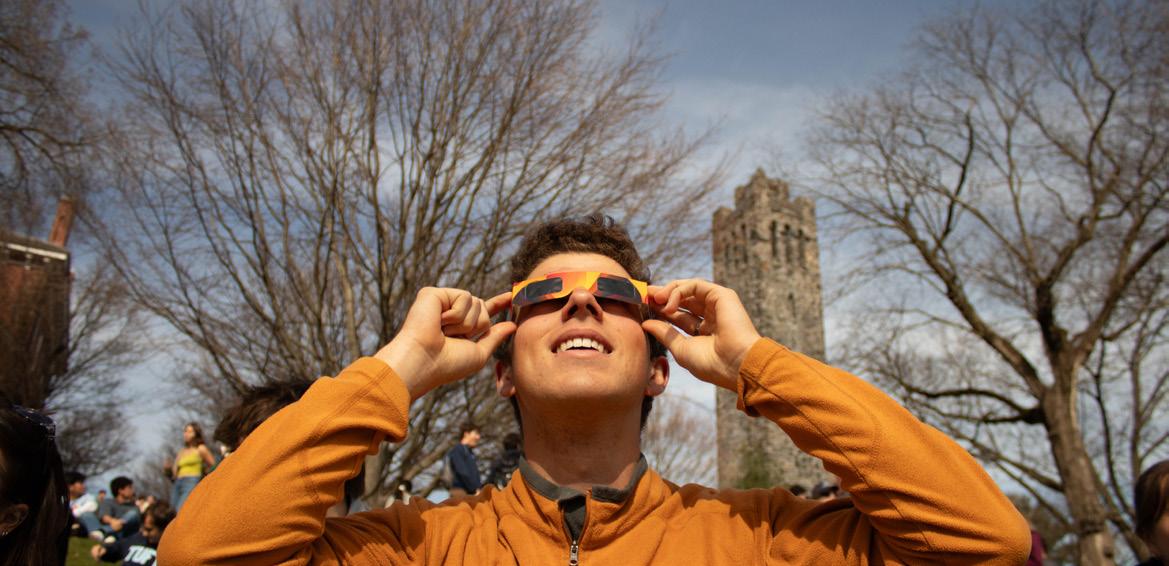
Thirty-nine candidates are vying for Senate seats, leaving eight of 44 positions open and three contested.
Here’s what to know about Fiona Hill, 2024 Commencement speaker
Fiona Hill, a former adviser to three U.S. presidents and the current chancellor of Durham University, will deliver the commencement address to the Class of 2024. University President Sunil Kumar announced Hill as the speaker on March 27.
Hill served as an adviser to presidents George W. Bush, Barack Obama and Donald Trump. In 2022, she was appointed chancellor of Durham University in the United Kingdom, a position she still currently holds.
“We’re honored to have Fiona Hill as this year’s commencement speaker. Her long and distinguished record of public service is in keeping with Tufts’ mission of civic engagement, and her personal story of the transformative power of high-
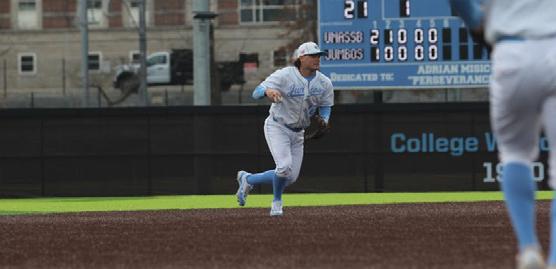


er education resonates with the Tufts community,” Patrick Collins, executive director of media relations at Tufts, wrote in an email to the Daily.
In addition to working as a presidential adviser, Hill was the senior director for European and Russian affairs on the National Security Council between 2017–19. She received a master’s in Soviet studies and a Ph.D in history at Harvard University and holds a master’s in modern history and Russian from St. Andrews University in Scotland.
Hill made national headlines in 2019 when she served as a key witness during Trump’s first impeachment hearing. In her testimony to a U.S. House of Representatives panel, Hill suggested that Trump had ulterior motives in urging Ukraine to


news features fun & games opinion sports tuftsdaily thetuftsdaily tuftsdaily The Tufts Daily The Tufts Daily tuftsdaily.com 4 FEATURES 9 OPINION 12 SPORTS TUSC flings students into spring Editorial: Jumb-dos and Jumb-don’ts Follow Fleischer onto field 6 ARTS & POP CULTURE Countless concerts within Charlie Card commutes 1 4 6 8 9 12 arts & pop culture T
GRAPHIC BY EMMA SELESNICK
Polls
Matthew Sage see ECLIPSE, page 3
he Tufts Daily
Tufts turns out for eclipse
open for TCU elections By
see TCU,
3
page
Estelle Anderson Executive Investigative Editor
UNIVERSITY UNIVERSITY UNIVERSITY
News
Editor
Carly Cohen University News Editor see COMMENCEMENT, page 3 see ADMISSIONS, page 3 see COST, page 3
Carly Cohen University News Editor
Saffiyah Coker, a senior studying economics and international relations, was selected as the winner of the Wendell Phillips award and will deliver an address at this year’s Baccalaureate Ceremony.
The award, established in 1896, is named for the attorney, women’s and Native Americans’ rights activist, and abolitionist. The award is given to a senior who demonstrates marked ability as a public speaker and a sense of public responsibility.
The winner of the award delivers a speech at commencement intended to urge the graduating class to reflect on how they might improve the world through civic engagement.
Coker is a Tisch Scholar and is highly involved in the Africana Center. In an interview with the Daily, she spoke about her work in civic engagement and what she hopes to convey to the Class of 2024 through her speech.
Editor’s note: This interview has been lightly edited for clarity and brevity. Tufts Daily (TD): I’m curious why you applied and how you found out about the Wendell speakership.
Saffiyah Coker (SC): That’s a good question. I found out about Wendell Phillips maybe a couple years ago. I was familiar with who the past grads are, being in the Africana Center
and being Black women on campus. Isabelle Charles and René l aPointe Jameson were always such great examples of how to live life and how to love your community. I knew that I wanted to speak at graduation because I’ve come to know a lot of different people on campus and a lot of different aspects of campus life. There’s so much strife and conflict, and I’m not gonna have the answers to all of that, but I wanted to say my piece and give my own reflections on how I feel.
TD: I was curious if you could talk a little bit about your background with civic engagement and what clubs you’ve been involved in on campus.
SC: My first year of college I was in JumboVote. We’re graduating in an election year and we came into college in an election year — I wanted to see what it meant to participate in a democratic process, especially because I could vote now. All the stuff that I did my first year at Tufts was to try and get my feet in a lot of different places, so I would try my best to get involved in the Africana Center.
Sophomore year, I became a Tisch Scholar, which has been one of my favorite and most important parts of my time at Tufts. It gave me such a valuable community. I met so many friends. But it also allowed me to get off Tufts campus and go into Somerville and Medford and
even Boston. I’m from Boston, but I went to school outside of where I live. For my first placement sophomore year, it was another election, and we did a lot of canvassing in my neighborhood, so Tisch Scholars gave me a lot of opportunities to get to know the Boston area.
TD: Do you feel like Tufts encourages people to be more civically engaged?
SC: I think that Tufts promotes a specific type of civic engagement, which is why I think it’s really important to think independently for yourself. The whole point of college is that it will teach you to think in a certain way. It doesn’t really matter the discipline; you’re coming here to learn a specific school of thought and then bring that thought out to the rest of the world. One thing my time at Tufts has challenged me to do is rethink what civic engagement is and who it’s actually for.
TD: Care to elaborate a little bit on that?
SC: When I think of civic engagement, the first thing that comes to mind is voting. But it also is a lot about community building, and it can seem like some of the programs that are emphasized are like, “volunteer!”
All of that stuff is really important, but another really important part is understanding, well, why are we volunteering? What does it mean to be in this space temporarily, for four years or a
semester? An important part of being engaged and civic-minded is like questioning the things that you’re doing, and I don’t really feel like we do that all the time.
TD: What kind of message do you hope to leave with the greater Tufts community in your speech?
SC: One of the main messages I’m trying to convey is the interconnectedness of everything. you’re obviously not studying everything; you’re studying your specific thing. But what I’ve really understood from my time at Tufts is that everything is connected. like, racism, for example, you can learn about that in science. you can learn about engineering through art and sociology. If we were to see everything that we’re doing less as disparate but more as building blocks upon each other, we could all have a new perspective.
TD: Is there anything else you’d like to add that I haven’t asked about? Hopes? Dreams?
SC: There’s a lot of pressure in college to find the ultimate version of yourself, but the version that you are now is only one version of you. We’re all still continuously changing into who we’re gonna be next. you may not feel like you’ve accomplished everything you wanted to, or you’re scared because you’ve accomplished so much and you don’t know what’s next; that’s fine, because it’s not done. It’s really just the beginning.
Voting for spring 2024 TCU elections begins
Almer Yu Assistant News Editor
Originally published April 10.
The spring 2024 Tufts Community Union elections are here. Polls are open from Wednesday at 12 p.m. until Friday at 12 p.m. All students will receive a link in their Tufts email address directing them to an electronic ballot.
Sophomores and juniors will decide their incoming class representatives in competitive elections. The Indigenous Peoples’ Community Senator seat remains vacant for a third semester, while no candidates are running to fill the newly vacated latinx Community Senator seat.
Students will have the opportunity to vote on representatives for the Senate, the Committee on Student life and the Judiciary. The Senate represents the TCU before the administration, allocates funds for student organizations and voices the concerns of the student body to faculty and trustee committees; the CSl collaborates with the administration to regulate and improve the student experience; and the Judiciary oversees official recognition of student organizations.
Around 75% of candidates are incumbents who have had previous experience in Tufts student government. According to luca O’ Neil, treasurer of the Elections Commission (ECOM), the neutral
body that facilitates all elections within the branches of Tufts student government, many students are running on platforms related to dining, community-specific representation and personal projects.
Only 24% of Tufts students voted in last year’s annual senate election, ECOM chair Charles Mitchell said. O’Neil emphasized the importance of voter participation in the upcoming elections as an exercise of civic engagement. Calling on students to make their voices heard, he said, “If you want change on this campus, this is where it is.”
The candidates and available seats are as follows:
Eight candidates are contesting for seven available seats on the Class of 2025 Senate.
• Anika Buder-Greenwood (incumbent)
• Blake Freedland (incumbent)
• Joel Omolade (incumbent)
• Mikayla Paquette (incumbent)
• Aniyah Perry (incumbent)
• Nessren Ourdyl (incumbent)
• lexis lokko (incumbent)
• Neelofar Tamboli
Eight candidates are contesting for seven available seats on the Class of 2026 Senate.
• Dhruv Sampat (incumbent)
• Nathaniel Kennedy
• Brooks Byrnes
• Adam Chernoff
• Arman Tendulkar (incumbent)
• Caroline Spahr (incumbent)
• Jose Armando (incumbent)
• Savvy Thompson (current
non-voting member)
Seven candidates are running for seven available seats on the Class of 2027 Senate.
• Michael Onysko
• larry Qiu
• Mikey Glueck (incumbent)
• Aaron Dickson (incumbent)
• Isabela Silvares lima (incumbent)
• Brendan French (incumbent)
• Jonah Feldman (incumbent)
There are two candidates contesting for the Southwest Asian and North African Community Senator position.
• Iman Boulouah (incumbent)
• lugin Afifi
The following seats are uncontested:
• Africana Community Senator: Rhoda Edwards (incumbent Class of 2026 Senator)
• Asian American Community Senator: Thy Nguyen (incumbent)
• Disability Community Senator: Amelia Farrar (incumbent)
• First Generation Community Senator: Alexander Vang (incumbent)
• International Community Senator: Mathew ltisinywa letua (incumbent)
• lGBTQIA+ Community Senator: Donovan Sanders (incumbent)
• SMFA Community Senator: Kunal Botla (incumbent)
• Women’s Community Senator: Krystal Mutebi (incumbent) There are five candidates run-
ning for seven available seats on the TCU Judiciary.
• Jacob Ackiron (inumbent)
• Kazi Begum
• Nick Dahlen (incumbent)
• Patricia Martinez
• Ethan VanGosen (incumbent)
There is one candidate running for five available seats on the CSl.
• Juna Hatta-langedyk
On Monday, ECOM held a candidate forum and meet-and-greet in the Joyce Cummings Center Atrium to provide an opportunity for students to speak with the candidates. In the following weeks, ECOM will continue to host a number of events to encourage votership and participation in the second leg of the election season, the presidential election. Presidential candidates, selected from within the Senate, are yet to have been nominated.
On Thursday, from 11:45 a.m. to 2:30 p.m., an Election Day ice cream truck on the Mayer Campus Center Upper Patio. Students who show proof of their vote can claim a free ice cream.
On Tuesday, from 7:30 p.m. to 8:15 p.m., ECOM will hold the presidential candidate nominations in Campus Center 220.
On April 23, from 7 p.m. to 9 p.m., the presidential debate will be held in Cummings Center 270. Time and location are subject to change, according to ECOM.
Ballots will be open for the presidential election from April 24 at 12 p.m. through April 26 at 12 p.m.
NEWS 2 THURSDAy, APRIl 11, 2024 THE TUFTS DAILY Visit tuftsdaily.com/tips P.O. Box 53018, Medford, MA 02155 T he T uf Ts D aily Rachel Liu Editor in Chief Julieta Grané Merry Jiao Managing Editors Marlee Stout Arielle Weinstein Associate Editors Olivia White Production Director Isabel Francis Business Director Matthew Sage Carmen Smoak Nate Hall Toby Winick Spencer Rosenbaum Adi Raman Estelle Anderson Maxwell Shoustal Nina Zimmerman Chloe Nacson-Schechter Veronika Coyle Michelle Shiu Bex Povill Rachel Wong Sarah Feinberg Josue Perez Carl Svahn Megan Amero Sam Berman Siya Bhanshali Mike Kourkoulakos Charlene Tsai Devna Aggarwal Claire Wood Natalie Bricker Kathryn Hood Max Antonini Meghna Singha Tom Jamieson Amber Abdul Anne Li Melinda Yung Ty Blitstein Caroline Vandis Executive News Editor Executive Features Editor Executive Arts Editor Executive Opinion Editor Executive Sports Editor Executive Science Editor Executive Investigative Editor Executive Editorial Editor Executive Audio Producer Executive Video Editor Executive Photo Editors Executive Graphics Editors Intentionality & Inclusivity Chairs Education Chair Social Chairs Assistant Production Directors Executive Layout Editors Executive Copy Editors Executive Social Media Managers Executive Newsletter Editor Assistant Business Director Ad Managers Alumni Liaisons Editorial Multimedia Committees Production Business Founded in 1980, Land Acknowledgement Story tips? Questions? Concerns? The Tufts Daily is the entirely student-run newspaper of record at Tufts University in Medford, Mass. An editorially and financially independent organization, the Daily’s staff of more than 100 covers news, features, arts and sports on Tufts’ four campuses and in its host communities. The Tufts Daily office is located on the colonized land of the Massachusett people and within the territories of the Nipmuc and Wôpanâak (Wampanoag) tribes. Let us know! visi t tuftsdaily.com/masthead
Q&A: Meet Sa yah Coker, this year’s Wendell Phillips speaker
UNIVERSITY UNIVERSITY
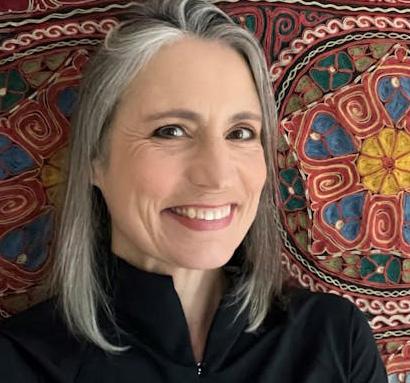
Durham U. chancellor to give Commencement address
Total cost of attendance to surpass $90,000
COMMENCEMENT continued from page 1 COST continued from page 1
investigate President Joe Biden and rejected the “fictional narrative” that Ukraine meddled in the 2016 election.
Rachel Applebaum, associate professor in the Department of History at Tufts, hopes Hill will address the war in Ukraine during her speech.
“I would be curious to hear her assessment of the war in Ukraine, which many commentators now see as having settled into essentially a stalemate, albeit a very deadly one,” Applebaum wrote in an email to the Daily. “Ukrainian civilians are paying a high price. I also hope she will draw students’ attention to the dangers of authoritarian and ultranationalist politics abroad and at home.”
Hill previously visited the Hill in February 2022, speaking on the war in Ukraine as part of a Fletcher School event. She is the author of the
books “The Siberian Curse: How Communist Planners l eft Russia Out in the Cold” and “Mr. Putin: Operative in the Kremlin,” as well as a memoir titled “There Is Nothing for you Here: Finding Opportunity in the 21st Century.”
Each year, the commencement speaker is selected by the Honorary Degree Committee, a subsection of the Board of Trustees. This committee, which Kumar sits on, submits recommendations for commencement speakers to be approved by the full board.
“The university considers nominees for commencement speaker and other honorary degree recipients who, at the time of their nomination, have a record of distinguished and sustained accomplishment in the varied academic, scholarly and professional fields represented at Tufts,” Collins wrote.
The 2024 Commencement ceremony will take place on May 19 at 9 a.m. on the Academic Quad.
Class of 2028 admits are 11% first-generation students
ADMISSIONS
continued from page 1
program. Accepted students represent 90 different college-access organizations that support low-income students. 11% of accepted students will be first-generation.
The Class of 2028 comes from all 50 states, including 80 students from Tufts’ host communities. Additionally, Tufts accepted over 400 international students representing 100 foreign countries.
Over 800 applicants applied to Jonathan M. Tisch College of Civic life’s Civic Semester program which will take place in Urubamba, Peru and Chiang Mai, Thailand. While offers of admission have now been made, 24 students are expected to enroll in this program ahead of this fall semester.
In the first admissions cycle since the Supreme Court ruling against affirmative action, Admissions staff did not have access to appli-
going up at the rate that the sticker price has been going up.”
However, concerns remain that the increased cost of attendance will impede socioeconomic diversity on campus.
“There’s very good evidence that especially lower-income students look at the sticker price and are discouraged from applying,” Professor of Economics Silke Forbes said. “That’s particularly bad for society because these are actually students who would get quite a bit of aid if they were accepted. Many of the low-income students would pay less tuition at a private, selective college than they would even pay at their state schools because state schools don’t give us much financial aid based on income.”
TCU Treasurer Dhruv Sampat, a sophomore, expressed worry about how the rising cost will influence the composition of the student body.
“We definitely don’t want to become a university that caters to a particular demographic just because of how expensive the tuition is getting,” he said. “That scares me.”
To better understand Tufts’ rising cost of attendance, Forbes suggests contextualizing rising tuition with rising inflation rates across the country: As she explained, the increase in Tufts’ total cost of attendance aligns with overall price increases in the U.S. over the past five years.
Several of Tufts’ peer schools’ total
costs, including Boston University and Wellesley College, have also recently surpassed the $90,000 mark. However, Tufts continues to lead the pack when it comes to tuition, in large part because of its relatively low endowment.
Hurley noted in an email to the Daily that “many of our peer institutions have larger endowments than Tufts, providing a larger percentage of their budgets from endowment payout.”
Forbes explained that a school’s endowment size greatly depends on the age of the school and the recipient of sizable alumni donations.
“Tufts used to be a much smaller, … more local school, and it didn’t have as many high-income or wealthy alumni,” she said. “We’ve become a much bigger player over the last few decades, … but donations and endowment often come from alumni, and so you have to kind of consider your history.”
Universities with smaller endowments — including Tufts — must provide more financial aid from their own budgets.
“We have to fund financial aid … as opposed to universities with bigger endowments that can fund financial aid much more from their endowment,” Forbes explained.
According to Hurley, other contributors to Tufts’ rising tuition include investments in diversity, equity, inclusion and justice efforts, faculty hiring and annual salary and benefit increases, including those determined by collective bargaining agreements. Ongoing renovations
UNIVERSITY
to Eaton and Bacon Halls have also raised Tufts’ cost of attendance.
As Zabel explained, enhancing the student experience by providing more services costs more.
“We have to have a great gym, better meal plans, better food. … Those kinds of costs have been going up as well,” he said.
Along with tuition, students at Tufts must pay expenses to participate in aspects of campus life, such as club membership dues. As TCU Treasurer, Sampat is working to mitigate the impact of these sometimes unforeseen costs and make extracurricular involvement more accessible to students. Over the past year, he has standardized club membership dues and expanded student leadership stipends, among other initiatives.
“When you have these tuition costs rising, there is a very real opportunity cost. If you have to pay so much money to attend the school, you may not be able to pay even more to participate in certain activities,” Sampat said. “I have to be very mindful as a student representative to make sure that I’m catering to all students and their very diverse backgrounds. What that means is I have to be cognizant of the changes that the university is making, too.”
Going forward, Hurley emphasized Tufts’ continued commitment to ensuring socioeconomic diversity on campus.
“That’s always going to be a priority for the university and making sure that we’ve got sufficient financial aid to accommodate it,” he said.
‘The campus just stopped’: Solar eclipse captures students’ attention
Matthew Sage Executive News Editor
“Since the next total eclipse visible from the Eastern Seaboard won’t occur until 2024, a great many amateurs will also be out to look at, and photograph this event,” an article in the Tufts Observer read the day before the last total eclipse fell over New England in 1970.
cants’ race and ethnicity information. Duck wrote that the Office of Admissions will not know the racial makeup of the Class of 2028 until the last student is admitted off the waitlist this summer.
Admitted students will have the opportunity to attend Jumbo Days on April 5, 12 and 26.
“Throughout the month of April, we will host virtual and on-campus events featuring faculty and staff from various university departments. These events will also provide you with an opportunity to get to know current Jumbos and some of your future classmates,” an accepted student webpage reads. “Our in-person admitted student open houses will include opportunities to attend mock classes, eat in a dining hall, hear from campus administrators, and interact with current students.”
Accepted students have until May 1 to accept their offer of admission.
But in a rare moment, scientific spectacle again eclipsed students’ usual academic schedules to bring hundreds of Tufts students flocking to President’s lawn, basking in the dim light of the most recent partial eclipse on Monday. From the Medford/ Somerville campus, students were able to catch a glimpse of a 93% covered sun using pairs of eclipse glasses, smartly passed between friends.
“It’s great to see the community come together and appreciate this natural wonder,” sophomore Cade Smith said. “And no one got their eyes burnt.”
At least one would hope. Many members of the Tufts community were out for the stellar sight, from students to faculty and staff.
“For a brief couple of minutes, the campus just stopped,” Katrina Barry, a Hodgdon-Food-on-theRun employee, said. “Everyone was just out together, playing nice and enjoying the eclipse. It was just awesome that everyone came together like that for a good rea-
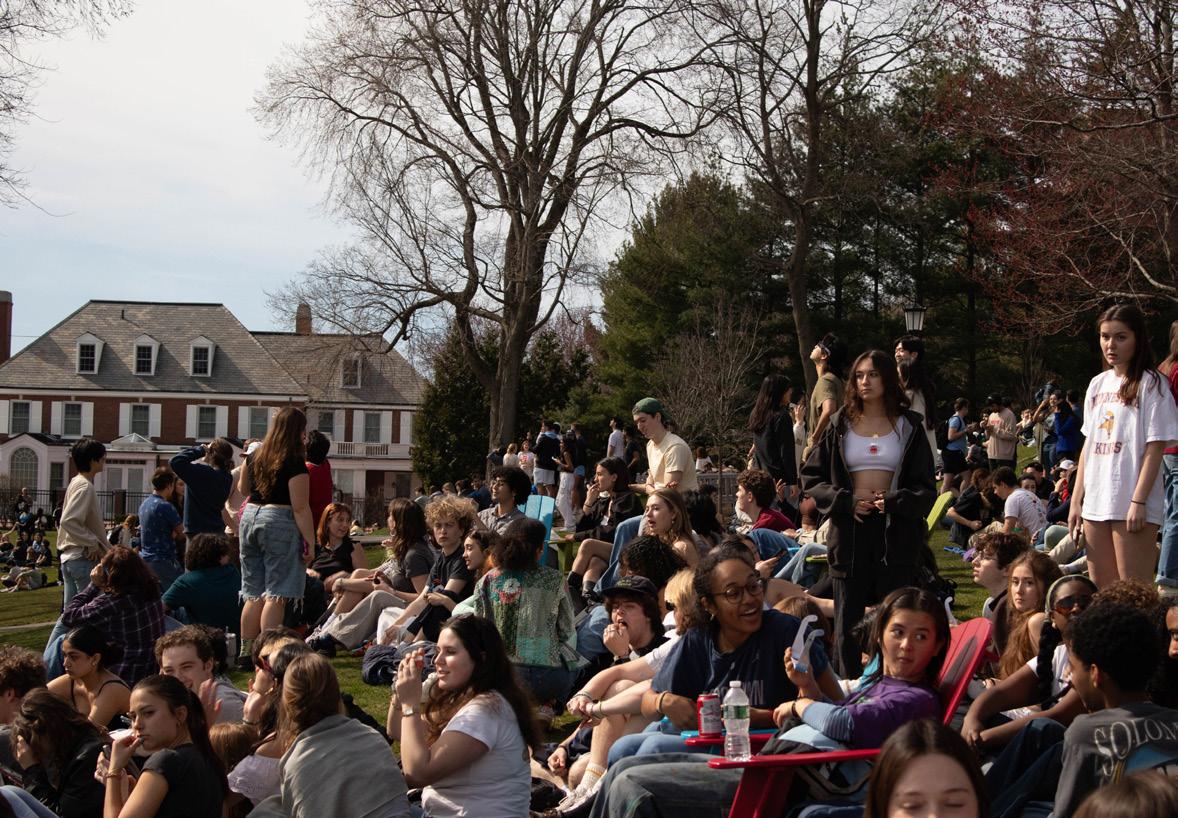
son, for a change. … I think it was a good day for Tufts all around.”
Barry and the rest of her coworkers also had the chance to view the eclipse using glasses provided by a gracious student, passing the pair down a line. Each took a moment to appreciate the sun’s brief disappearance.
“I’m an old folk, so I’ve been there, seen it before,” Barry said. “But it’s never going to stop striking awe when I look at something like that — how magnificent nature is and what it can do.”
Students did not watch only from the Boston area. Members of the physics department and the Society of Physics Students embarked on a 19-hour journey to Burlington, Vt., where the eclipse reached full totality and covered the landscape in complete dark-
ness. According to sophomore Ryan luo, a member of SPS’s executive board, it was many students’ very first time seeing a full solar eclipse — including his own.
“When else is the chance that you can get to see this?” luo asked. “As someone who is interested in physics and astrophysics, it was just amazing. It was breathtaking.”
Although another total solar eclipse is not predicted to fall over North America until 2044, students were able to appreciate a brief moment of community.
“It was amazing to see how many students even on campus, who didn’t get to go up to the path of totality, how interested they were in it,” luo said. “It really reflects just the community itself, how happy they are to see such a cool thing.”
NEWS 3 THURSDAy, APRIl 11, 2024 THE TUFTS DAILY
COURTESY FIONA HILL
Fiona Hill will speak in front of the graduating Class of 2024.
MATTHEW SAGE / THE TUFTS DAILY Students gathered on President’s Lawn to catch a glimpse of the eclipse.
FEATURES
A concert 43 years in the making: What goes into pulling o Spring Fling?
Audrey Peel Staff Writer
Spring Fling, Tufts’ annual outdoor concert, will take place on April 20 this year. The prefinals celebration was first created in 1980 thanks to a surplus in the Tufts Community Union Senate budget that year. In its inaugural year, Spring Fling included a picnic, a concert, a 10k race and seminars. Since then, the annual event has evolved into a staple of campus life.
But while much of the student body excitedly looks forward to the concert, the vast amount of planning required to make the event a success largely goes unspoken. Spring Fling is organized by the Tufts University Social Collective, which also puts on storied campus events, including Senior Week, Battle of the Bands, the Winter Ball and Bingo.
According to Davis KurepaPeers, co-executive coordinator of TUSC, Spring Fling is the club’s largest event.
“Spring Fling is definitely the [event] that’s the most hyped up and the one that people are always looking forward to,” she explained. “This is the event that is the most attended each year.”
Due to Spring Fling’s significance to campus culture and the complexity its organization requires, planning for the iconic event starts as early as the summer beforehand.
“The process of acquiring artists begins in the summer. We brainstorm artists that we like and we receive a list from our talent buyer (Pretty Polly Productions) of some artists that are interested in doing college shows,” Gus Tringale, one of the concert coordinators, wrote in an email to the Daily.
It’s safe to say that booking the artists takes a considerable amount of time, money and effort. According to Jade Altschul Matushenko, co-executive coordinator of TUSC, working through the talent agency can extend the process as well.
“Most of the communication goes through the talent agency that we use,” she said. “We don’t really communicate with [artists] directly other than the day of, which makes it take a lot longer because we send an email to [the talent agency] and then they forward it to the artist’s team. … It
takes quite a while to do all the back and forth.”
This year, TUSC was allocated a $120,000 budget for booking artists. But even with a generous budget, certain performers’ fees can skyrocket out of TUSC’s price range.
“It is surprising how much money it takes to get certain artists. Sometimes we inquire about artists we know we won’t be able to get just to see how expensive they are. For example, Snoop Dogg is listed as 1M,” Tringale wrote.
The rest of the budget goes toward other non-artist related fees, which include security, staging, lighting, sound systems, food and beverage and other features.
In creating the lineup of performers, TUSC also tries to cater to the wide variety of music tastes on campus. This included sending out an Instagram survey to better understand music trends among Tufts students and booking artists from different music genres.
“When choosing artists, we do try to get a variety of music [genres],” Kurepa-Peers said. “All three of our artists are catering towards different music tastes in the [hope that] there could be something for everyone.”
For TUSC coordinators, the day of Spring Fling looks different than most other Tufts students. All coordinators contribute two hours of volunteering throughout the day, and the concert coordinators, Tringale and Thomas Grant, work the entire day from 8 a.m. to 6 p.m.
“In the morning, we have to make sure the artist has all their desired items on their rider and set up the green rooms. We coordinate with TEMS, [Green Dot], etc. to ensure everyone is on the same page … so many people are going to be working so that the event goes smoothly!”
Tringale wrote. “This does not mean we don’t get to enjoy the event. We hop in and out of the crowd during the event to hear our favorite songs.”
In addition to providing concert-goers with quite the show, Spring Fling allows an opportunity for student bands to make an appearance on stage. In Tufts’ annual tradition, the student band that wins the Battle of the Bands is awarded the chance to open Spring Fling.

After the Beelzebubs performed the inaugural year in 1980, other Tufts bands and singers have also performed, including Ella Jane in 2022 and Fease last year.
Some Tufts bands even return to campus to headline at Spring Fling after graduation. One such band is Guster, the successful alternative-rock band that produced hits such as “Satellite” and “Amsterdam.”
The group, which met during Tufts Wilderness Orientation as first-year students, started writing and performing songs right away.
“Our first show was at l ewis Hall, it was in the lounge, and we were called Ryan, Brian, and Adam,” Guster drummer Brian Rosenworcel said.
Rosenworcel also reflected fondly on the rivalry between bands on campus and the lifelong friendships that they created as students.

“By the time we were upperclassmen, we had a rival in Papas Fritas who were so good and very different from us. … But we’re still really good friends with them, and Tony, the singer, he helped us write ‘Amsterdam,’” Rosenworcel shared. “Several years after we graduated, Tony came to us with some chords for a song that he thought was Gusterish, and so that became ‘Amsterdam.’”
Since graduating from Tufts, Guster has performed at Spring Fling multiple times beginning in 2001.
“We all really loved Tufts. We had a great time, and we spent four years in Somerville after we graduated,” Rosenworcel said. “We really love and appreciate the community that launched us and supported us.”
Bringing together alumni, students and musicians,
Spring Fling truly has a lasting legacy. Whether it be current student bands to past ones, we all get to enjoy the talent on campus.
As students look forward to celebrating on April 20, TUSC student volunteers continue to work to ensure that everything runs smoothly. All concert attendees are encouraged to take advantage of the amenities, such as the Chill Zone area, for students who need to take a step back from the crowds, and the available pizza and water.
l ike the many Spring Flings that have taken place before this one, it is sure to be a memorable weekend for all. This event is created for Tufts students by Tufts students. It unites us across all majors, interests and even generations, for a brief period on the Academic Quad in a celebration of our community.


FEATURES 4 THURSDAy, APRIl 11, 2024 THE TUFTS DAILY
GRAPHIC BY GRETTA GOORNO
Cutting through the red tape of accessibility at Tufts
When people hear the word “accessibility,” they often associate it with ramps, elevators and parking spots. While these are helpful aids to people with physical disabilities, the often overlooked issue, especially on a college campus, comes in the form of academic accessibility. One would think that Tufts as an institution of higher education would make academic accessibility a top priority within its classrooms. However, that is not always the case.
Junior BFA student Sam Webb spoke about their challenges with getting accommodations for both physical and academic disabilities at Tufts while pointing out a key difference between the two.
“The fact is, my physical disabilities and chronic illness are the reason I have gotten accommodations,” Webb said. “If I had walked in the door and started off with saying I have an ADHD and depression diagnosis, I would not have been taken as seriously. There are more students on this campus, I think, who struggle with their mental health and dealing with executive dysfunction, depression and burnout than I think do with chronic illnesses. And that’s not to say that those two things are separate. They’re inherently intertwined.”
Webb pointed out the difference in gravity given to physical disabilities over mental disabilities, which can be seen in the Tufts resource centers as well as in professors’ responses.
Kim Ruane, chair of the mathematics department, expressed the animosity felt by some professors towards academic accommodations, who cite increasing numbers of student accommodations as creating difficulty in meeting the specific needs of those students.
“In faculty or department meetings people keep throwing out the phrase, ‘there are more and more students with accommodation,’” Ruane said.
Ruane countered this line of thinking by arguing that there may be a deeper issue in pedagogy.
“Is it that those particular students need accommodation? I personally feel like it’s more like traditional methods of teaching might not be working,” she said.
Specifically, Ruane has learned that students learn in a variety of ways and exams may not be the best way to assess whether or not a student has learned course material.
“One thing I’ve learned over the years from dealing with students that have a range of accommodations … is understanding that not everybody learns the same way,” she said. ”[Assessing student learning] might not come in the form of a written exam that’s really high stakes, that is 75 minutes of your life where you’re sweating.”
Responding to these realizations, Ruane has tried to implement graded assignments that are not just timed exams, such as projects and group work “activity days.”
“I get to see the students in a different way, I get to see who has collaborative skills, especially when working on math problems,” she said.
Beyond changing teaching strategies, Ruane has also worked with the Student Accessibility and Academic Resources Center — also known as the StAAR center — which is in charge of all academic accommodations for students, extensively throughout her time at Tufts.
As a student in need of accommodations, Webb has had plenty of communication with the StAAR Center as well. Some of Webb’s accommodations stem from changes in the SMFA classes that affect all students.
“It’s frustrating being a BFA student, [because Tufts is] increasing the number of hours for studio classes to five hours in one day and not increasing the number of credits,” Webb said. “When you add one hour to in-class work, you’re adding three hours to the student side.”
Webb went to the StAAR Center to request accommodation for reduced course work amid the increase in class hours. They spoke to accessibility specialist Jesse Neikrie, who was surprised to hear about the changes.
“She told me ‘Sam, this is the first I’m hearing of this. We have been asking to be included in these conversations with admin and academics, but we haven’t been included,’” Webb said.
While Webb ended up receiving their reduced coursework accommodation, it was not without them gaining insight into institutional issues.
“The biggest [issue] in trying to navigate the systems on this campus is the offices on this campus do not talk to each other,” they said.
Kirsten Behling, associate dean of student accessibility and academic resources at the StAAR Center, explained the communication that the center does.
“We work to connect with students and professors in many different ways.
… We also offer one-on-one meetings with students and professors who may have questions about specific accommodations or need more information about their role in the process,” she wrote in an email to the Daily.
Ruane agreed from the perspective of professors who may not be experts in accessibility and accommodations.
“We can communicate with the StAAR Center and there [are] great people out there that we’ve worked with [on complex accommodations, because] we don’t know how [some accommodations] look in a math class,” she said.
leandra Elion, who teaches the course Disability and Difference in Children in the child study and human development department, has a fresh perspective about professors being more in control of making their classrooms accessible.
“I feel like I understand all the accommodations that are available to students through the StAAR Center, … and I’ve tried to incorporate that into my class so that students can see I’m explicit about it,” she said.
Elion expressed that it could be more difficult for other professors with required material to cover to make the same changes in the classroom as she did.
Ruane expressed a similar sentiment.
“There’s a certain responsibility we have in foundational classes that build upon each other and that other departments [expect] students have taken, [like] calculus or physics … [and professors expect] that [students] have a certain body of knowledge,” she said. “We feel an obligation to make sure that’s happening, or at least present it so that students have the opportunity to learn it.”
STEM classes, math ones in particular, are usually quite cyclical with assignments being turned in weekly. Ruane feels as though she and other members of her department find some accommodations dealing with assignment extensions difficult because students may fall behind.
“That is a disaster from the viewpoint of multisection courses … and pedagogically, we don’t see it as something that could possibly be helping the student,” she said. There’s a machine in place and when one little thing goes off that machine, parts start flying everywhere.”
Elion expressed that the Center for the Enhancement of l earning and Teaching at Tufts offers resources from workshops to faculty study groups to
help faculty best build accommodations into their course design, which can help keep the “machine” more intact.
Ruane shared her frequent participation in CElT workshops and how helpful they have been in making her classroom both more accessible and inclusive.
“Just [at the] base level, they’re great because you get to talk to other people that care about teaching,” she said.
Heather Dwyer, the associate director for teaching, learning and inclusion at CE lT, elaborated on professors increasing academic accessibility in the classroom.
“Academic accessibility is largely about changing the learning environment proactively so that more students can access learning materials and experiences,” she wrote in an email to the Daily.
She gave some examples of ways in which teachers can implement classroom changes.
“Universal Design for l earning (UD l ) is a useful framework for thinking about accessibility. In this framework, instructors consider how to provide students with multiple means of engagement, representation, action/ expression,” she wrote.
These practices are not only beneficial for students with accommodations already but also those who just have a different way of learning information.
In the end, academic accessibility is a complex and intersectional topic.
“Disabled or not, accessibility is a blanket affecting everything that happens here on campus from your political activists who are protesting for a cause to your students who are just trying to get through [organic chemistry],” Webb said. “When we’re talking about accessibility, on campus, it’s all soup — it is all mixed together. It is all one thing. But there is no one good answer, there’s no ‘one size fits all.’”
Webb argued that many students face inaccessibility in academia by reaching a point of burnout, which is often not seen as abnormal or a signal of deeper issues in academia. However, maybe with a change in the way students learn in higher education, colleges can try and alleviate some of burnout’s root causes.
“Academia has a long history of being exclusionary, elitist, and conflating rigor with ‘difficulty for the sake of difficulty.’ As a result, sometimes longstanding disciplinary practices feel at odds with accessibility. But this need not be the case,” Dwyer wrote.
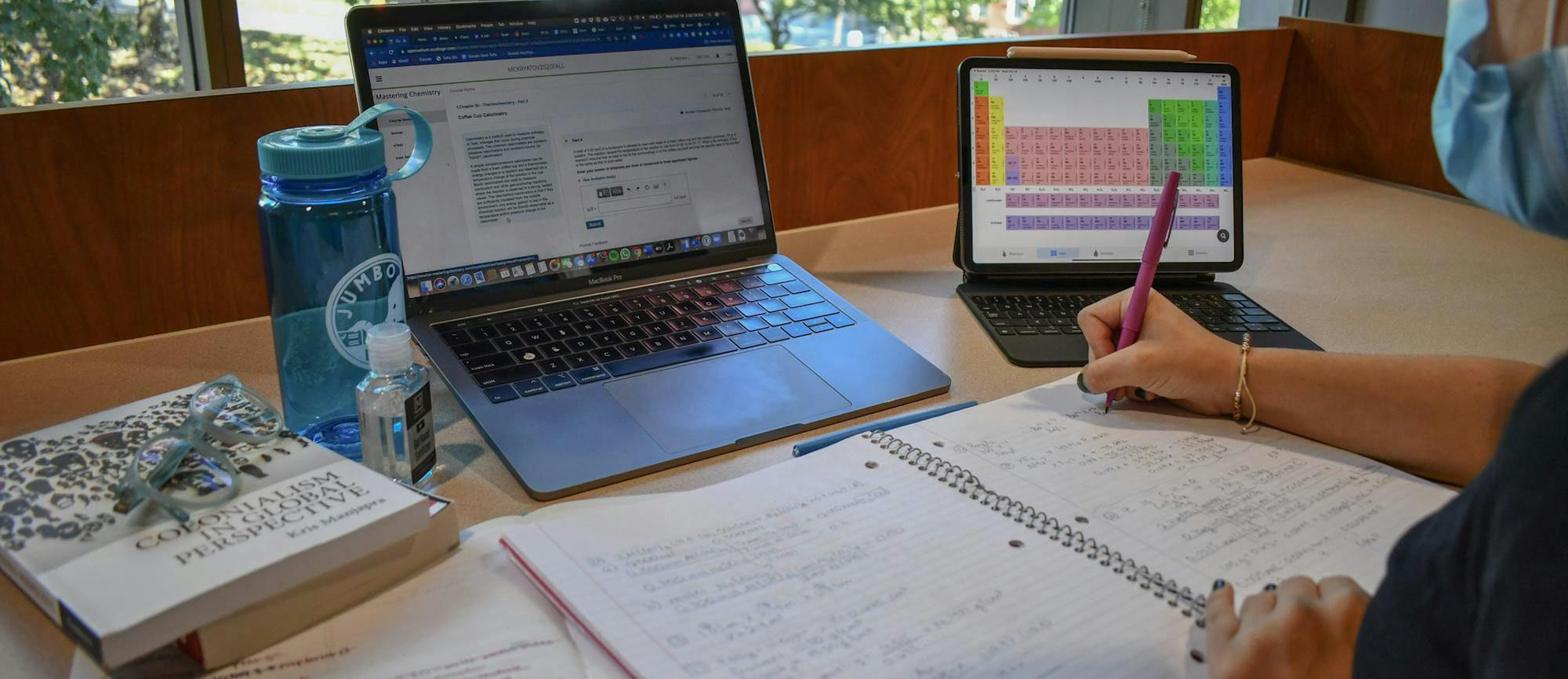
FEATURES 5 THURSDAy, APRIl 11, 2024 THE TUFTS DAILY
AVA IANNUCCILLO / THE TUFTS DAILY
Dylan Fee Staff Writer
exam on Oct. 14,
A student is pictured studying for a chemistry midterm
2020.
ARTS & POP CULTURE
Best Boston concert venues on the Green Line
Shannon Murphy Arts Editor
With the Green l ine now extending to Tufts, getting to see your favorite artists live in concert when they come to Boston is easier than ever. While there is plenty of young, local music thanks to schools like Emerson College and Berklee College of Music, Boston is also host to many popular artists on tour. There is no shortage of places to hear live music around Tufts, but if you ever find yourself riding on the T and looking for somewhere to rock out, here are a couple of must-visit venues within a 10-minute walk from Green l ine stops!
TD Garden
Green line Stop: North Station
Ticket Price: $$$
The home of the Celtics and the Bruins, “The Garden” is a Boston staple located directly above North Station, just a few stops away from Tufts. Here, you can see some of your favorite popular artists on tour. Most recently, Olivia Rodrigo and Nicki Minaj performed their hits in the giant, round arena which seats nearly 20,000 people. While its size may feel overwhelming, the Garden is extremely accessible, with 34 restrooms and 42 permanent concession stands available.

Sometimes, on the day of the concert, the outside of the venue also lights up in colors associated with the artist performing, reflecting the excitement of live entertainment into the Charles. MGM Music Hall at Fenway
Green line Stop: Hynes Convention Center
Ticket Price: $$
This 5,000 person venue is located right next to the iconic Fenway Park. The outdoor ballpark has had a history of offering concerts during the summer months, but its new indoor music venue operated by l ive Nation
Entertainment brings even more performers to Fenway. It opened not too long ago in August 2022, but its beauty is well beyond its years, with a huge stage that can be seen from every seat in its three levels. The glamour of MGM makes for an unforgettable concert experience, complete with modernized lighting and sound systems. Having hosted artists of all types, from smaller acts to bigger names like boygenius, Mitski and Kesha, Fenway’s new addition to the music scene is sure to have a long star-studded future ahead.
Paradise Rock Club
Green line Stop: Babcock Street
Ticket Price: $
A much more intimate venue with a capacity of 933, Paradise Rock Club is a place where you can connect with your favorite local names or touring alternative artists. located on Commonwealth Avenue near Boston University, the club always attracts a plethora of college students due to its proximity to so many schools. Many popular artists made stops at Paradise before their fame skyrocketed, including Aerosmith, Billy Joel, Carly Simon, The Talking Heads, Coldplay, Grace Potter, Hozier and Father John Misty. Whether you know all the words to the artists’ songs or just want to bask in pure musical excitement, this oasis of vibes can’t be beat.
No-No Boy blends music, history in immersive live performance
No-No Boy is the stage name of Julian Saporiti, an indie-folk singer-songwriter whose music is like nothing you’ve ever heard — or seen — before. In a performance at the Granoff Music Center on April 2, Saporiti performed a selection of songs from his new album, “Empire Electric” (2023), along with several songs from his earlier projects alongside his wife and creative partner Emilia Halvorsen Saporiti. With a unique blend of music and history, Saporiti’s performances explore stories of the Asian experience in America, from both his historical research and his own life.
Saporiti’s background is not that of a typical musician — he studied music at Berklee College of Music and spent his 20s in an indie-rock band before entering the world of academia, where he focused on researching untold historical narratives of Asian Americans. For his Ph.D. in ethnomusicology and American studies at Brown University, Saporiti returned to his love of music, writing more than 100 folk songs for a dissertation that incorporated his own historical research to tell deeply personal stories of imperialism, identity and intergenerational trauma.
“I had done so much research in grad school. I started grad school in 2012, and by 2016, I started writing these songs,” Saporiti said. “And because I had been a musician for 10 years of my life and done it as a full time career, I knew that was the best way for me to communicate with the world, way beyond [how] academic papers would ever be able to.”
Saporiti takes a uniquely multimedia approach to music making — his performance at Tufts featured visuals projected on the wall behind him, including images from his own travels and historical research; and many of the songs incorporated layers of sound, using archival
recordings from historical sites and audio recordings from his own travels to create an immersive sonic experience. His song “Mekong Baby,” which explores his mother’s relationship with her home country of Vietnam, is what Saporiti describes as a “sonic collage.” The song includes nature sounds from both Vietnam and his mother’s current home of Oregon, along with recorded vocals from Vietnamese pop singer Thai Hien, who accompanies Saporiti’s live vocals to create a “jagged duet in two different languages.” The song’s percussion is created from archival recordings of gunfire from the Vietnam War, which emphasizes the lasting impact of war on the country and its population.
Saporiti describes No-No Boy as a “placemaking project” that helped him discover parts of his own identity that were previously unexplored.
“Growing up in Nashville in a mixedrace refugee family, place wasn’t something that could be taken for granted because my mom doesn’t have a place to go back to, and we didn’t have a lot of family around,” Saporiti said. “So this was finding lineages, finding histories that I could call my own, whether that was because they were also musicians or because they kind of looked like me or experienced the same things.”
Saporiti’s performance was introduced by Diego luis, a history professor at Tufts whose research focuses on latin American history. luis is a longtime friend of Saporiti and a former classmate of his at Brown, and research from his recently released book “The First Asians in the Americas: A Transpacific History” served as inspiration for one of Saporiti’s songs. The song, titled “1603,” tells the story of Antón Tomás, a man from India who made a daring voyage from Mexico to Oregon.
Saporiti also wants his audiences to rethink what it means to be Asian American. By reimagining traditional narratives of Asian immigrants and
emphasizing the broad historical scope of Asian immigration, Saporiti hopes to teach listeners that Asian American stories are “not just dumplings and trauma.” His songs cover a wide range of topics drawn from his research and travels, including “Crystal City,” which describes the experiences of Japanese Americans interned in Texas during World War II, and “Close your Eyes and Dream of Flowers,” which describes his visit to an ICE detention center on the U.S.-Mexico border.
Audience members were especially riveted by “The Best God Damn Band in Wyoming,” a joyful folk song that
During a Q&A session after the concert, audience members shared how Saporiti’s music resonated with their own personal experiences, and luis praised Saporiti for his ingenuity and his ability to tell historical narratives in a novel way.
“[The project] is inspired from things that you’ve read — primary sources, libraries, archives — but knowledge doesn’t only lie there, right? To notice things, to experience the world, to see the places that you’ve read about, you have to go somewhere,” luis said. “Doing that work makes you feel something … and you can create something from that. I think oftentimes, the thing that you end up creating

describes the George Igawa Orchestra. This big band formed inside a Japanese American concentration camp in the 1940s. Before the song, Saporiti described how his research and travels in Wyoming led him to discover the band’s story and eventually allowed him to connect with several of the band’s surviving members.
is an academic paper, which is fine, there’s a time and place for that … but that’s not to say that’s the only thing you can create. And I think that the No-No Boy project is an excellent example of how you can use your own talents to express that emotion that you get from doing the work.”
“Empire Electric” is now streaming on Apple Music and Spotify.
ARTS & POP CUlTURE 6 THURSDAy, APRIl 11, 2024 THE TUFTS DAIly
Nate Hall Executive Arts Editor
VIA WIKIMEDIA COMMONS. Kendrick Lamar performs at a concert at TD Garden on July 22, 2017 in Boston, Mass. on the The DAMN. Tour.
COURTESY PATRICK NITTI.
Julian Saporiti is pictured.
6 months for $0. Streaming, savings, and free delivery. New members only. Terms apply.
ADVERTISEMENT 7 THURSDAy, APRIl 11, 2024 THE TUFTS DAILY
Olivia: “Is this someone’s special box of dirty candy?”

Antonio Alphonse
Tyler Alphonse
Katrina Aquilino Kaitlin Aquilino
Juliet Baker
Anika Buder-Greenwood
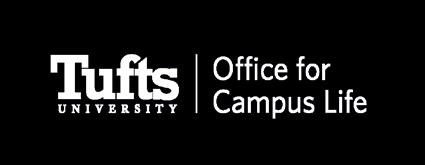
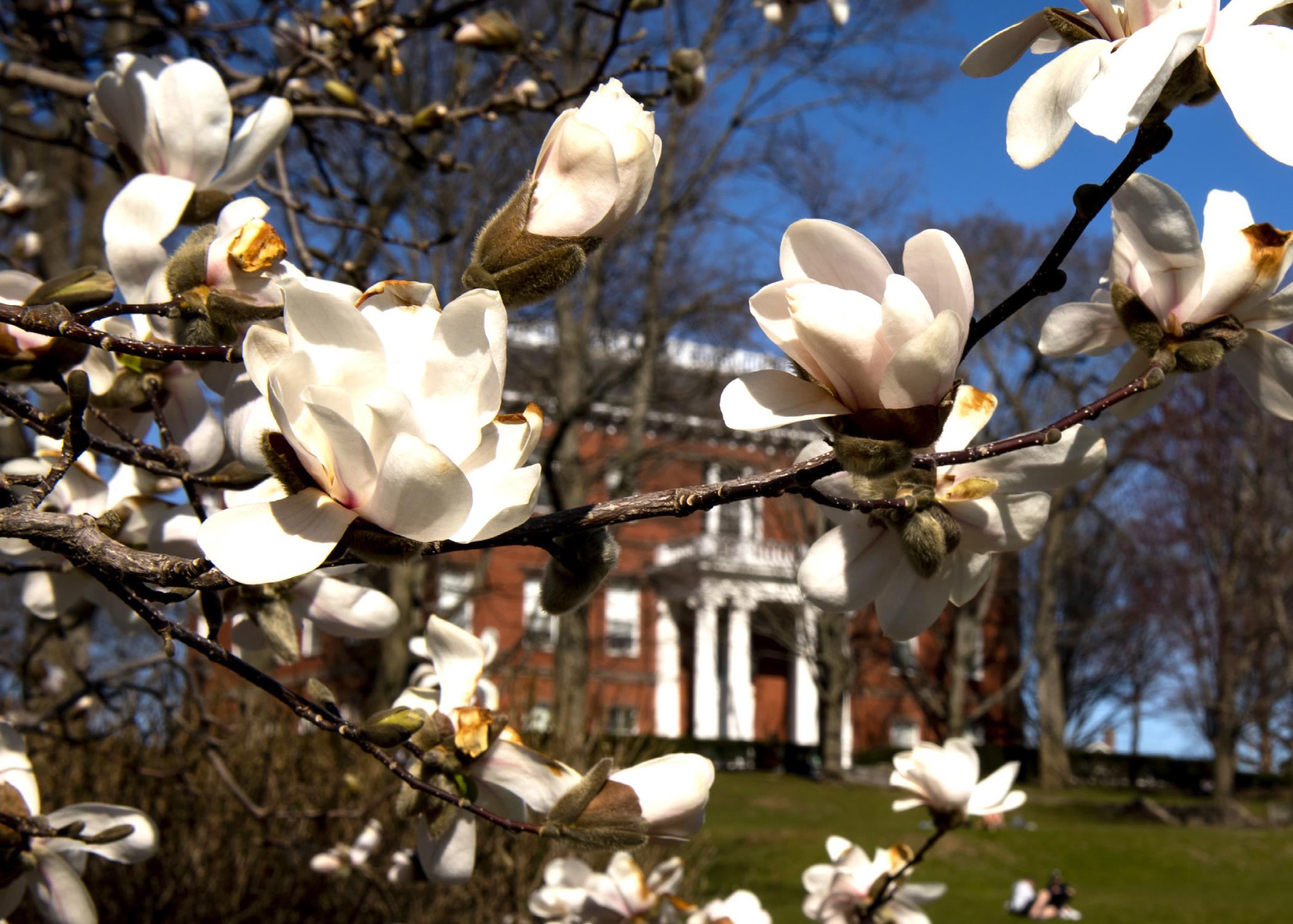
Baccalaureate Ceremony 2024
Saturday, May 18, 3:00 p.m. • Gantcher Family Sports and Convocation Center
Join your classmates for the annual Tufts Baccalaureate Ceremony, the day before Commencement. The ceremony will feature senior interviews, musical performances, and multifaith blessings from the Tufts University chaplains. Safyah Coker, A24, will give the Wendell Phillips Address and President Kumar will offer remarks to the class. Your families and friends are all invited, and we hope you enjoy this beautiful ceremony honoring your class. Please wear your cap and gown.

Scan the QR code for more information about the event
FUN & GAMES F U N & GAMES 8 THURSDAy, APRIl 11, 2024 THE TUFTS DAILY F& G
Night At The Daily CROSSWORD
Late
Happy Jumbo Month! Nate Hall 1 2 3 4 5 6 7 8 9 10 11 12 13 14 15 16 17 18 19 20 21 22 23 24 25 26 27 28 29 30 31 32 33 34 35 36 37 38 39 40 41 42 43 44 45 46 47 48 49 50 51 52 53 54 55 56 57 58 59 60 61 62 63 64 65 66 67 68 69 70 ACROSS 1 Molten rock 6 Without 10 One crossing the line? 14 Pseudonym 15 The Jonas Brothers, e.g. 16 Bucket 17 The newspaper you're currently reading 19 Michael who wrote "The Neverending Story" 20 CPR provider 21 "Game of Thrones" character (and homophone of 7D) 22 School board? 24 Driver of film 25 Pre-requisite for some STEM majors, for short 26 Corp. leadership 29 Tufts building that once housed a taxidermied Jumbo 34 Tehran native 36 Tufts department that offers kathak and ballet 37 Result of some Tufts Athletics games 38 Sign at some beaches 40 Item on a to-do list 42 Turkish title 43 Denials, in the German House 46 Tufts club that studies US-China relations 47 The edition of 17A you're currently reading 50 God, in the Spanish House 51 Angers 52 Pirate's activity 54 Comes up 57 Seniors' org. 58 Goal for the Men's Golf team 61 Domesticated 62 Former president of Tufts 65 "Highway to Hell" band 66 Rim 67 Russian country house 68 What students might leave Tufts with 69 Saxophonist's need 70 Velocity DOWN 1 Member of an all-gender Tufts a cappella group, for short 2 Tufts grad 3 What a recent Tufts grad might receive 4 Yoga accessory 5 Syria's Bashar al-_____ 6 Hold a grudge 7 Solo in a Tufts Opera Ensemble performance 8 Zilch 9 Popular Chinese condiment 10 Commencement 11 Fires 12 Opera set in Egypt 13 Huffed and puffed 18 Colorless 23 Glue brand 24 Periodic table fig. 25 Anderson Cooper's channel 26 Rapper Nicki 27 "Star Wars" character better known as Baby Yoda 28 Palindromic title 30 Actor (and onetime Tufts attendee) Wilson 31 Company that created Pong 32 Jargon 33 Starts of Daily articles 35 Tune out 39 Part of an academic year at Tufts 41 "Ant-Man" actor Paul 44 Apple platform 45 Wandered off 48 Split 49 Damage 53 Music players of the 2000s 54 Slightly 55 Boston Marathon, e.g. 56 Website for film buffs 57 Halo wearer, in the French House 58 Tempo 59 Feel the pain 60 Way to go 63 Praiseful poem 64 Siesta Interested in submitting a puzzle? Reach out to production@tuftsdaily.com
Oyinkansola Akin-Olugbade Awo Ali
Henry Chandonnet Tygan Chin Saffiyah Coker Trishna Dahal Sophie Dorf-Kamienny Sophia Duncan Marlon Fagundes Pereira Jaden Ferraro Marina Garrido Freya Gupta
Henry Taylor Hill
Johnson Oumou Juwara
Keough Lily Pearl Langos Lexis Lokko Shahadah Manzer Joey Marmo Brian McHugh Jasmin Mena Theresa Nguyen Tim Panilaitis Anelise Pardo Navya Sammeta Jane Schmelkin Eden Sekwat Emma Sodie Viviana Stulack Ryan Syblis Olivia Tan Gus Tringale Becca Whitaker
Wilson Sarah Wriggins
Kimmy
Violet
Josh
Maddy
HAPPY STUDENT STAFF APPRECIATION WEEK! WE ARE SO THANKFUL FOR YOU OCL Student Staff 2023-2024 ‘Happy Jumbo Month!’ by Nate Hall
Tufts University
OPINION
EDITORIAL
The Daily’s 2024 declassified Tufts survival guide
by The Editorial Board
If you’re reading this article right now, you might be a newly admitted student to Tufts University. First of all, congratulations! As the Tufts Daily Editorial Board (that’s us), we hope to make your years at Tufts better by providing our infallible wisdom as students slightly older than you. Even if you aren’t an admitted student, we hope the quick tips and tricks we’ll lay out for you in this guide are still helpful.
1. Don’t buy textbooks before the first day of class. Professors will explain the extent to which textbooks will be useful for their class and often reveal that they are not necessary. If you do need a textbook, there are alternative avenues that are almost always more affordable than the bookstore: Some are on reserve, some you can find online. For literature classes, check out ThriftBooks for cheap and reliable secondhand books.
2. Get a city library card for discounted admission to museums, among other benefits. It’s free with proof of your Massachusetts mailing address. In our experience, a letter mailed to your on-campus address or even an email from the Office of Residential l ife & l earning has sufficed. The Somerville Public l ibrary West Branch is a short walk away in Davis Square, and the Boston Public l ibrary in Copley Square is well worth the visit and accessible on the Green l ine. In addition to books, you can reserve museum passes for free or reduced admission to the Museum of Science, New England Aquarium, Institute of Contemporary Art, Isabella Stewart Gardner Museum, Museum of Fine Arts and others. (The MFA is also free with a Tufts ID, but the free passes are useful if friends and family are visiting.)
3. Sign up for the free food e-list. you’ll get emails when events end with extra food — it is both free and is usually better than the options in the dining halls.
4. Classes to consider in the fall: First-year yoga, Technical and Managerial Communication with Amy
Hirschfeld, Introduction to Psychology with l isa Shin and Samuel Sommers, Introduction to the U.S. Healthcare System with Amy l ischko, or any class with David Proctor or Jess Keiser. The Experimental College Explorations seminars are also a unique first-year experience that provides interesting commentary on often unconventional topics.
5. If you’re having trouble navigating SIS — the Student Information System — on your phone, the easiest fix is to “Request Desktop Website” in your mobile browser before you log in to SIS. This may not mean anything now, but it will save you when you’re frantically trying to find the listed classroom on the first day of classes.
6. Give upperclass men meal swipes. It’s a rite of passage for first-years, who are required to pur chase the premi um meal plan, to use their eight guest swipes to treat upper classmen to a meal at DewickMacPhie Dining Center or Fresh at Carmichael Dining Center. Sharing a meal is a great way to make a new friend and get advice from someone who has been in your shoes.
7. If you want to get onto the Dewick roof, which you shouldn’t, whether it’s for “Pumpkining” (the tradition of placing pumpkins on high places for Halloween) or just to
hang out, which, again, you shouldn’t, walk in between Hodgdon Hall and Dewick, go behind the line of trees on your left and you’ll see the lowest part of the Dewick roof. From there it is up to you to climb. Or don’t! This fun spot is not recommended by the Editorial Board.
8. Get coffee from the Sink — it’s good! Tufts’ student-run coffee shop, the Sink, lives on the second floor of the Mayer Campus Center and serves beverages such as chai, mocha, drip coffee and cappuccinos as well as snacks like muffins, cookies and bagels. However, the real stars of the Sink are the specialty drinks: lucy in the Chai, Medford Fog, Cinny Vanilly and Hot Karl, to
name a few. This Editorial Board recommends ordering a small iced Bee Sting with oat milk.
9. If you’re ever in the mood for free ice cream, the Dean of Students Office on the seventh floor of Dowling Hall has a freezer usually stocked with ice cream sandwiches, popsicles, drumsticks and more. When you walk in from the front entrance, go through the first hallway on your left and then into the first room on the left every Monday through Friday from 9 a.m–5 p.m!
10. Vote! Make sure you figure out your absentee ballot situation before you come here. Consider whether your vote is more valuable in the Medford/Somerville area or in your hometown. JumboVote is a great resource.
walk away. Bring a blanket, food and friends for a scenic picnic on the water.
13. Things you should bring to Tufts: two towels. Comfy slippers. A fan. Cold medications. Notebooks/paper, if you take notes by hand. A fighting spirit to tackle the Targets shared by other Boston schools. Go to the Somerville or Everett Target, not the Porter one for dorm stuff. Somerville’s Target is easily accessible by bus.
14. Things you shouldn’t bring: A TV or expensive electronics for your dorm room. New versions of household essentials you already own — dishes, pillowcases/pillows, decor, laundry basket. Phone wallet (you’ll get free ones).
15. Some of our favorite local
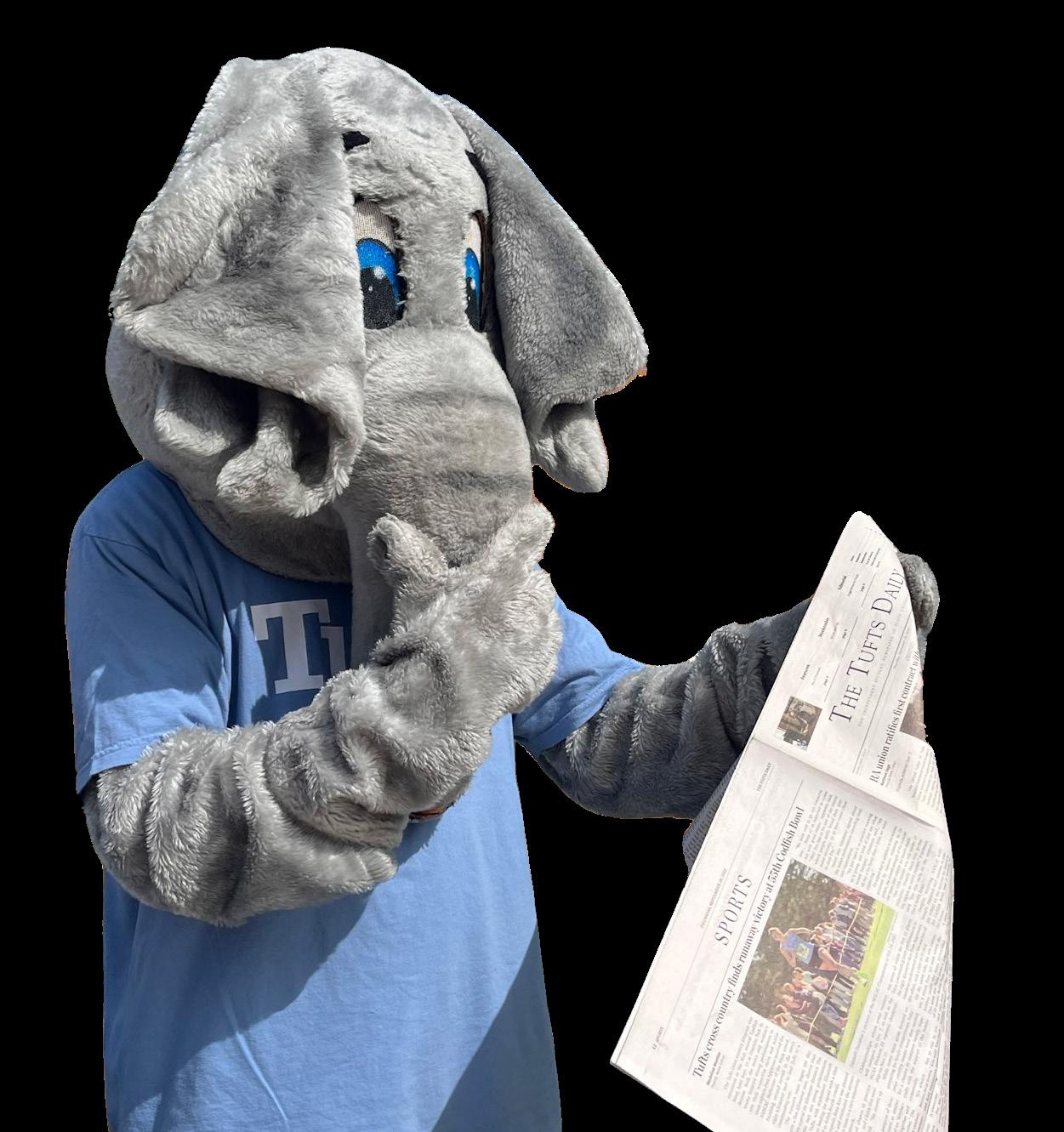
OPINION 9 THURSDAy, APRIl 11, 2024 THE TUFTS DAILY
The Tufts Daily is a nonprofit, independent newspaper, published Monday through Friday during the academic year, and distributed free of charge to the Tufts community. The content of letters, advertisements, signed columns, cartoons and graphics does not necessarily reflect the opinion of The Tufts Daily editorial board. EDITORIALS: Editorials represent the position of The Tufts Daily Editorial Board. Individual editorialists are not necessarily responsible for, or in agreement with, the policies and editorials of The Editorial Board. Editorials are submitted for review to The Tufts Daily Executive Board before publication. VIEWPOINTS AND COLUMNS: Viewpoints and columns represent the opinions of individual Opinion editors, staff writers, contributing writers and columnists for the Daily’s Opinion section. Positions published in Viewpoints and columns are the opinions of the writers who penned them alone, and do not necessarily represent the opinions of the Daily itself. All material is subject to editorial discretion. OP-EDS: Op-Eds provide an open forum for campus editorial commentary and are printed Monday through Thursday. The Daily welcomes submissions from all members of the Tufts community; the opinions expressed in the Op-Ed section do not necessarily represent the opinions of the Daily itself. Opinion articles on campus, national and international issues should be 600 to 1,200 words in length and submitted to opinion@tuftsdaily.com. The editors reserve the right to edit letters for clarity, space and length. All material is subject to editorial discretion and is not guaranteed to appear in the Daily. Authors must submit their telephone numbers and day-of availability for editing questions. ADVERTISEMENTS: All advertising copy is subject to the approval of the editor in chief, executive board and business director.
The Daily has been the highlight of my time at Tufts — it can be yours, too
When I applied to Tufts, the Daily was not even remotely on my radar. In my application essays, I indicated interest in a few different clubs and organizations. I thought: Maybe I’ll join an a capella, musical theater or Indian dance group, all of which I’d done in high school.
In the fall of 2020, I arrived on campus and immediately isolated in my new home. I went to a few ballroom meetings on Zoom and sent in a video audition to our notoriously selective a capella clubs. By the end of the semester, I’d found no good way to connect with the greater Tufts community beyond the people who lived in my hall that I attended Zoom classes and ate dining hall takeout with.
Over break, overcome with emotion at a news report about climate change, I wrote an article and sent it to my aunt, who suggested I send it to my school newspaper. That was my first introduction to the Daily. I joined the Opinion section and have been there ever since, serving as the executive opinion editor in fall of 2022.
Joining the Daily was one of the best decisions I made at Tufts. The Daily presents an incredible opportunity for anyone interested in journalism or writing — especially because Tufts does not offer a journalism major. At DailyCon, our semesterly training, illustrious Daily alumni and Boston-area journalists share their hardearned knowledge, giving students an idea of what a future in journalism can look like. This semester, Craig LeMoult (LA ’01), Tufts alumnus and WGBH reporter, shared his experience covering the Sandy

Hook shooting, highlighting the sensitivity required to cover such an emotional and deeply tragic event.
The Daily is one of the largest organizations on campus and offers a multitude of opportunities at various levels of involvement. In fact, every one of my housemates has been involved in the Daily at some point in their Tufts career, even though our majors range from history to economics to biomedical engineering. Sections such as Graphics, Business and Layout are all ways to be involved even if you don’t enjoy writing or editing, while the Video and Audio sections offer options in multimedia storytelling. Our written sections, where my experience lies, are just as varied.
Through the News, Features, Arts and Pop Culture, Opinion, Sports, Investigative and Science sections, you can write about whatever interests you most.
I am incredibly proud to be involved in this organization. We are editorial -
ly and financially independent from the university. Our strict fact-checking standards, even for opinion articles, mean that while we have been sued before, we’ve never lost in court. The Daily’s commitment to accuracy and airtight sourcing is one of the lessons I will take with me after graduation this May, particularly at a time when social media and artificial intelligence are altering our news landscape. This is only possible through excellent organization and student leadership. Each semester a new set of students — seven on the Managing Board and one to two heading each section — take the reins, following our carefully designed protocols and making adjustments to constantly improve the paper.
The Opinion section has been my place since I joined my freshman spring. By this article, my 38th, my writing and edit-
A senior’s guide to Tufts’ best study spots
Tisch can get busy, so be sure to arrive early to grab a seat.
Congratulations on your acceptance to Tufts! I will always remember the feeling of joy I experienced when I opened my Tufts acceptance letter. Getting into Tufts is an amazing achievement, and you should be extremely proud.
Tufts is filled with hard-working, bright students. We study a wide variety of subjects and are members of over 350 clubs. We do work all over campus, everywhere from our dorms to the library. If you decide to attend Tufts, you will need to know the best study spots on campus. As a second-semester senior, I have spent my time studying in many locations, and I hope to provide insight into my favorite spots so you can be prepared for your arrival in Medford.
Tisch Library — First Floor
The library is the quintessential study spot at Tufts. Featuring four floors, Tisch Library is a great place to study no matter what type of work you have or what time of year it is. The classic rule of thumb is that the farther down you go, the quieter it gets. yes, students enter the library on the second floor because of the hill, and they are immediately greeted with rows of desks and book stacks. Tisch has large tables which are great for group work.
I prefer the first floor of the library, which has an abundance of tables and individual study carrels. The first floor is quieter than the second, largely because copious collections of books and archives take up potential seats, leaving the first floor with fewer occupants. I go here if I have work that needs to get done. During finals and midterms,
Finally, Tisch has the Tower Café, a small coffee shop where students can grab a pick-me-up and quickly return to studying.
Joyce Cummings Center
The JCC is home to the economics, math and computer science departments, as well as several other programs. Located near the Steve Tisch Sports and Fitness Center, the JCC can be a hike for some students depending on where they live; however, the JCC is one of my personal favorites because of its ambiance and decor, and because there’s a Starbucks inside — be sure to order before the end of class to avoid long wait times.
Students from all majors, not just those from departments housed in the JCC, flock there regularly. Each floor has small tables that can be easily rearranged to accommodate groups of any size. On the fifth floor, there is a collaboration room with only six or seven tables that overlook Boston and many Tufts athletic fields.
The JCC is a great study spot for students who rely on caffeine. Its biggest weakness: the lack of tables.
Science and Engineering Complex
Though the SEC houses the School of Engineering, most Tufts students study there at some point. Its biggest draw is Kindlevan Café, the dining establishment at Tufts famous for fresh smoothies. Kindlevan also serves up a variety of coffee and tea beverages, baked goods and sandwiches.
The SEC doesn’t have many tables, but it’s a great space for working alone or in a group. However, if you choose to study here, you have to be OK with background noise. Between student conversations and
ing skills have improved immensely from when I started. I have learned so much from so many incredible writers and editors, both ones who’ve long since graduated, and ones who joined the section only recently. Leading the Opinion section my junior fall was certainly not easy, but it was one of the most valuable experiences of my Tufts career. I’ve deeply enjoyed the editing process where I’ve been able to suggest changes to strengthen opinion arguments, even ones I don’t agree with. Vetting and editing op-eds and communicating with people from the broader Tufts community who submitted them has been a unique and rewarding experience. Getting the chance to introduce new writers to the Daily, guiding and watching them grow as writers and editors and serving under two of them as their second-in-command this year has been one of the greatest joys of my time here.
Most importantly, the Daily is a community of people working toward a worthy goal: publishing the best paper that we can. We are also a community of college students; in the Daily, many of us have found our closest friends. While I have long been resistant to the clunky portmanteau “Dailmunity,” it really does represent the ties that bind us together as members of this extraordinary publication, no matter where in the sprawling production process you lie. From our written sections, to Copy and Layout, to our multimedia sections, to the Business section that finances our operation, we are all connected by the paper you hold in your hands. If you are an admitted student reading this, I hope you enjoyed your first copy of the Tufts Daily, and we’d love to see your name in print this fall!
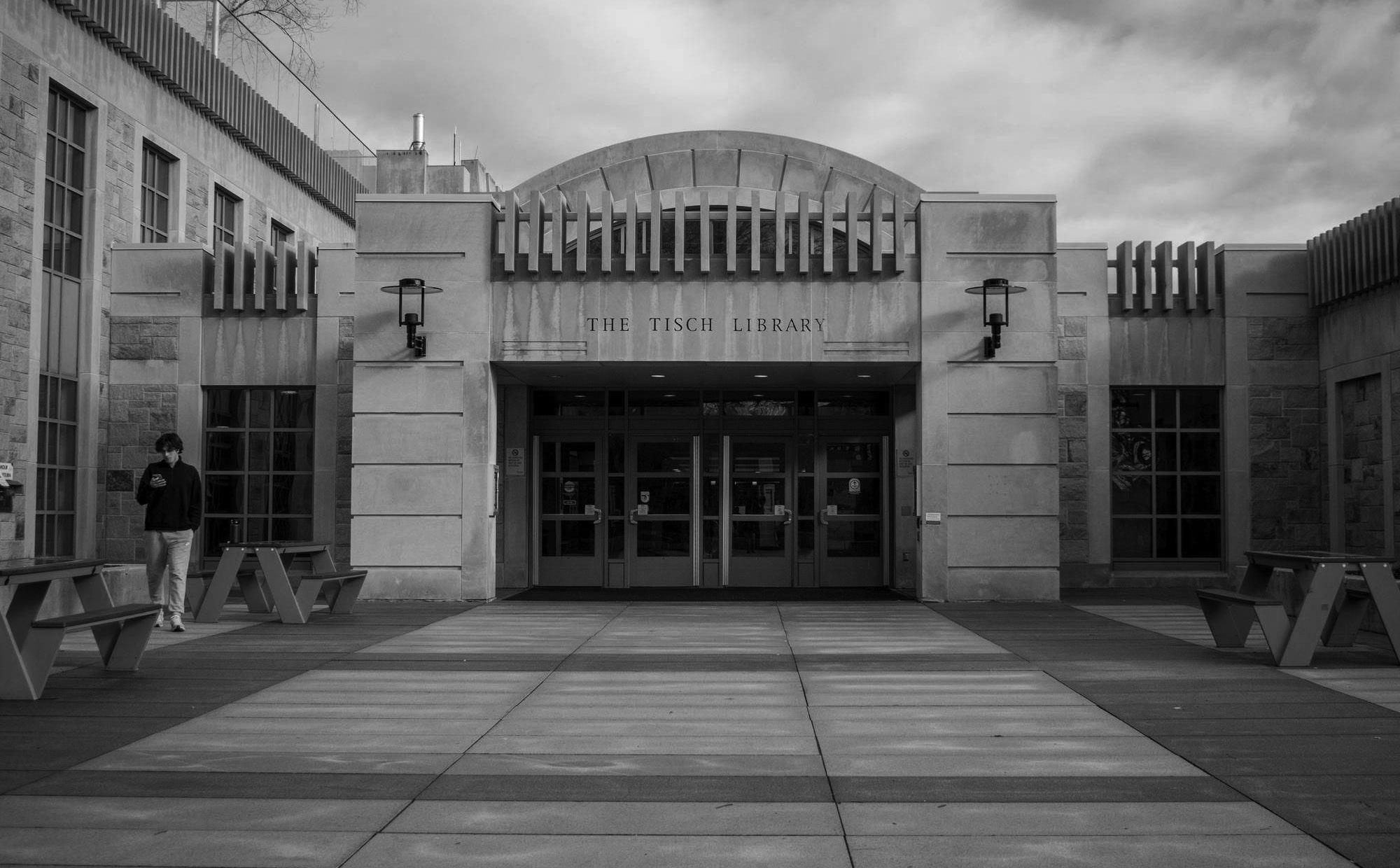
the roar of the blenders, you’ll be inundated by the hustle and bustle of campus life all around you. Not even noise-canceling headphones can save you.
Residence Halls
Not everyone likes studying in hyper-studious locations. Dorms and common rooms can be tranquil and comforting, especially if you are studying with your dormmates. When I arrived at Tufts in 2020, our only choices were to study alone or with our immediate neighbors, which, in retrospect, I am thankful for from a friendship perspective. Even with COVID-19 restrictions no longer in the picture, studying in your dorm is a great option with minimal distraction. Some dorms have better study spots than others. In Miller Hall, where I lived my freshman year, there are several common rooms and study rooms where you
can be productive. I preferred studying outside of Miller, but studying in any of the dorms is great for putting the finishing touches on a paper or problem set.
Dining Halls
This one isn’t super obvious, but the Tufts dining halls — Fresh at Carmichael Dining Center or the Dewick-MacPhie Dining Center — are great study spots for those looking to maximize the value of their meal swipes. If you swipe into a dining hall in the early morning, you can stick around through lunch and get two meals for the price of one swipe. During off hours, the dining halls are relatively quiet and can be great for getting quality work done.
I hope I’ve given you some ideas for where to study if you decide to attend Tufts. Congrats on your acceptance! Pax et Lux!
OPINION 10 THURSDAy, APRIL 11, 2024 THE TUFTS DAILY
Kumar Deputy Opinion Editor
Reya
Opinion Editor VIEWPOINT
Kevin Golub
VIEWPOINT
SOPHIA KHAN / THE TUFTS DAILY Tisch Library is pictured on March 3.
VERONIKA COYLE / THE TUFTS DAILY
The Tufts Daily newsroom is pictured on April 6.
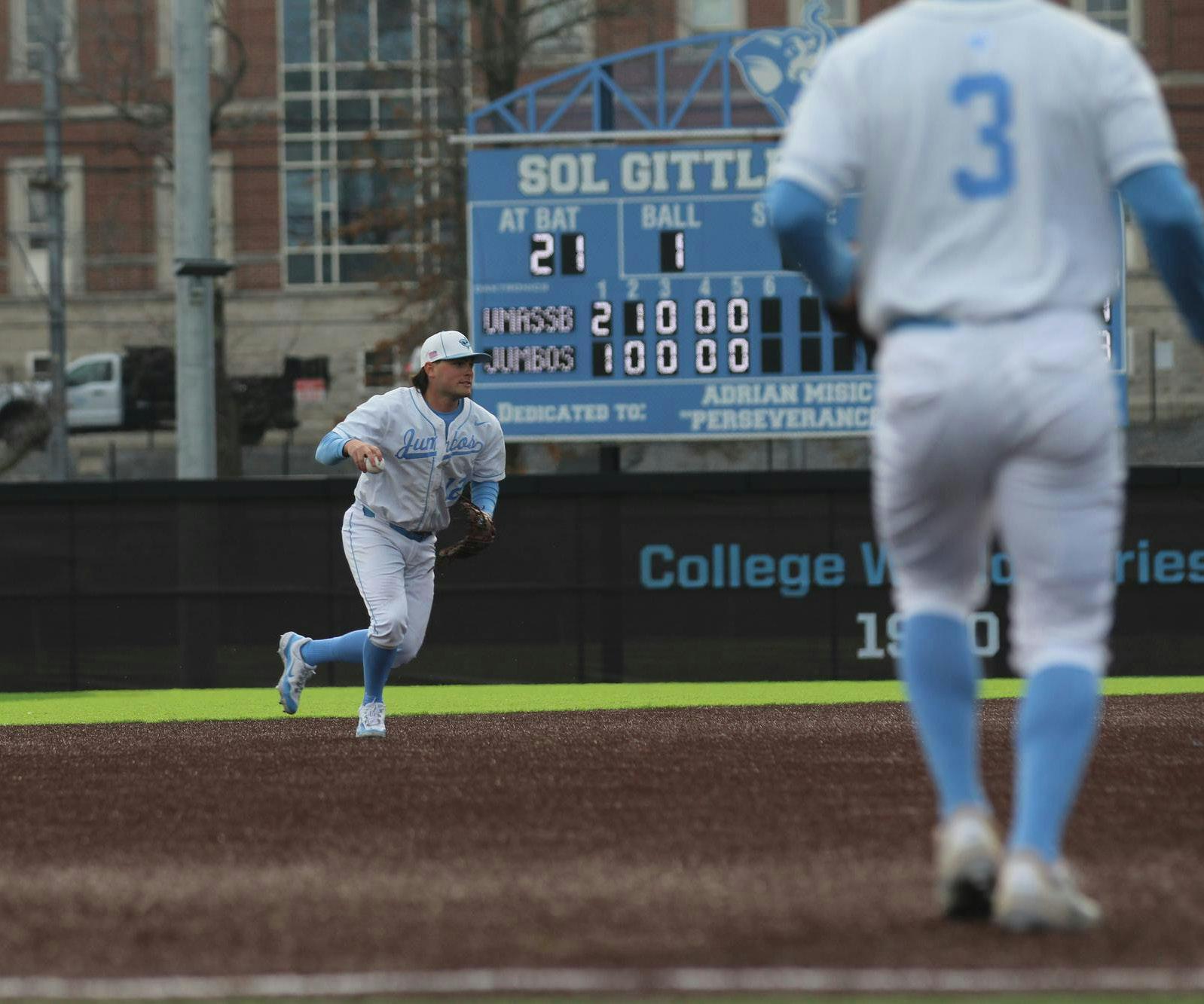
A day in the life of Ozzie Fleischer on game day
Nick Dohr Staff Writer
As starting shortstop for the last three years, senior Ozzie Fleischer has consistently been both a dynamic and an impactful player on the Jumbos baseball squad. Fleischer hails from Texas and attended Fort Worth Country Day High School. At Tufts, he is majoring in political science and will be attending the Fletcher School of law and Diplomacy next year. Baseball fans might get the chance to see him on the field as shortstop for another season thanks to his extra year of eligibility due to COVID-19.
l ike many other Tufts athletes, Fleischer was a dual-sport athlete in high school, almost playing for the Jumbos on the football field as well. On the baseball field, he has been a key defensive player, keeping a level head in the important situations. His total batting average for his Tufts career is .310, and he has started 100 games for the Jumbos. Notably, he was selected as the 2023 NESCAC Defensive Player of the year and made the American Baseball Coaches Association Division III AllDefensive Team.
On a typical weekday gameday, Fleischer is out of bed at 8:30 a.m. at the latest, eating breakfast at around 9 a.m. His breakfast typically varies — usually he eats an egg and cinnamon toast, but he will make himself something more substantial if he has time.
“I love breakfast, but I don’t live and die by eating a crazy breakfast every morning,” Fleischer said.
Class for him then usually runs from about 10:30–11:45 a.m., before he picks up Alexander’s Food and Convenience for lunch. While the lunch meal varies a little bit, it frequently is a lighter sandwich that he brings to eat in the locker room. Somebody in the locker room is always “on aux” playing music. That person is frequently senior outfielder Johnny Briody, who is the go-to “team DJ” before games. Two of the most pop-
ular team songs right now are “Afraid to Feel” by lF System and “Take Me to America” by Salvatore Ganacci. Fleischer emphasizes that in the locker room, listening to music together helps build team chemistry, which can be the difference between a good team and a team that can win national championships. Fleischer himself isn’t a “hype music” person in the locker room, typically preferring relaxed country music to keep himself focused before game day. As he gets dressed in his Tufts regalia, small superstitions start to appear: He always puts on his left sock and left shoe, then his right sock and right shoe. The team then will start to get batting practice materials ready by 12:30 p.m.
The team will go into their normal stretching routine, which takes about 10–15 minutes. From there, for a 3 p.m. game, the team will start batting practice at 1 p.m., which entails splitting the team up into groups and rotating around the field, hitting and receiving a variety of different balls. Batting practice typically lasts about 40 minutes, and then the other team takes the field to do their batting practice. Fleischer typically heads to the locker room to get off his feet for about 20 minutes, sometimes drinking a Red Bull if he feels it’s necessary. As a captain and a defensive player, he will then try to catch the last round or two of batting practice of the opposing team to get an idea of what type of hitters the opponents are.
He will then walk back to the field for an “in and out” drill, which is a long series of ground balls thrown across the diamond between the outfield and the bases. During this period, the team might also walk through any prewritten plays and sequences they need to practice. Right before “in and out,” all the hitters get together and talk about sign sequences, along with if coach Paul Svagdis has said anything to them specifically before the game. Before the national anthem as well, the team will do a variety of running and agility warm-ups in left field. This is where
Owen Short Moments ‘Til Madness
A new era of college
There it is, folks. The 2023–24 NCAA men’s basketball season is officially over. Just like every year, we had incredibly talented teams, captivating storylines and an abundance of exhilarating games. But still, this year looked very different.
The best example of this is our national champions, the University of Connecticut Huskies. After what was already a commanding title run in the 2023 tournament, coach Dan Hurley followed it up with an even more impressive and dominant tournament performance in 2024. Most would say that isn’t too out of the ordinary, as UConn had won it the year before, so how hard can it be to run it back?
outfield coach Bob Clarke will get the lineup together and give the team a history lesson or a fun fact about the team they are playing.
The lineup will then get together and stand for the national anthem. After the anthem, before Fleischer puts his hat back on, he always gives his heart two taps with his hat. While some players and some sports are big on pre-game speeches by the captains, he doesn’t speak unless he needs to, instead focusing on leading by example, and being level-headed at all times. While he naturally has been excited about the prospects of the team this season, his focus has been on “not getting too high on the highs, not getting too low on the lows and just being super steady throughout the process,” something he thinks can take them far this season.
When the Jumbos finally take the field in the first inning, Fleischer always taps his left foot and then his right foot on second base before heading out to shortstop.
Baseball games are doubleheader heavy, especially in the NESCAC. So between games, Fleischer will eat a protein bar or a Clif Bar. However, he likes to feel light on his feet so won’t eat a ton in between games. That being said, there are guys on the team who always have candy on them, and he will have some candy from time to time, especially when it’s Nerds Gummy Clusters.
At the end of each game, Fleischer will nearly always be one of the last people out of the dugout, making sure everything at the dugout is all set. This is especially the case for away dugouts, where he makes sure the team leaves the visiting dugout better than they found it.
Fleischer’s favorite part about Tufts baseball is the team culture, especially because his class of seniors are his best friends: “This whole team really is a family, and that is what I think is so special about this group, and why I love it so much, and why I think that this team could really do some cool things this year.”
When the University of Florida completed the incredible achievement of going backto-back in the 2006 and 2007 seasons, Billy Donovan brought back his top-seven leading scorers for their second championship, making the task quite a bit easier. But, for Hurley and the Huskies, it wasn’t that simple. After their 2023 title, three crucial starters left for the NBA, with one being Adama Sanogo, the 2023 NCAA Tournament Most Outstanding Player. Furthermore, they lost senior Joey Calceterra, one of their important bench pieces. This left Hurley with a big hole in the roster and a lot of points to make up for in the offseason. Reloading was the only option and that’s what he did. Picking up four-star transfer Cam Spencer from Rutgers and enrolling their five-star first-year Stephon Castle, UConn had two new starters this season. But still, not many believed this would be enough to make it back to the title game. The Huskies placed sixth in the preseason AP Poll and had a lot to prove. Soon, though, people began to realize that this team was a legitimate contender.
By Week 11 of the poll, UConn was back on the top of the sport. While it didn’t stay that way the whole season, this squad was certainly one of the favorites to win it. By Selection Sunday, the Huskies were the No. 1 overall seed, and everyone knows what took place after that. With the highest total tournament game point differential on record of 140 points, Hurley accomplished something that very few coaches or teams have ever done: winning two consecutive national championships.
Obviously, Hurley is a great coach and knows how to win big games, but I think there’s more to see here. Before the 2010s, bringing back close-to-full rosters wasn’t a rarity. But with the introduction of the oneand-done path and the transfer portal, roster turnover is absurdly low. UConn’s 2024 season gave everyone the new blueprint to success in college hoops: the transfer portal. While Cam Spencer was their only newcomer from the portal, I believe he might have been the most important player on that team. Without him, I can’t imagine they could’ve made it to that title game. But they’re not the only ones who saw this. Teams like Houston University, the University of Tennessee, the University of North Carolina and more all took advantage of the portal and ended up as top seeds in the tournament. Not to mention, we saw the antithesis of this with the University of Kentucky. Coach John Calipari, who left after this season, had always created rosters with an emphasis on high-level freshmen talent and look where that got them: a first-round exit as a 13-point favorite and a coaching role to fill.
The new recipe for national championships is here.
Owen Short is a sophomore who is studying quantitative economics. He can be reached at owen.short@tufts.edu.
SPORTS 11 THURSDAy, APRIl 11, 2024 THE TUFTS DAILY
COURTESY TUFTS ATHLETICS
Ozzie Fleischer is pictured in the March 27 game against the University of Massachusetts Boston.
Zachary Gerson
In the Crease
Most improved teams
This week’s focus is once again not a specific award; we’ll go into the most improved teams from this season. These are the teams that have shown the most growth from last season to this season.
Most Improved Team: Vancouver Canucks
The Vancouver Canucks have had vast improvement from last season to this season all across the board. As a team, the Canucks finished with 83 points last season, which put them 12 points out of a playoff spot. This season, however, has been a completely different story. They are already up to 104 points, which currently has them in first place in the Pacific Division, and have clinched a playoff spot in the 2024 Stanley Cup playoffs. That is quite a significant team improvement in one season. In addition to the team’s overall improvement, it seems as if many Canucks players have made individual improvements this season, which has helped propel the team to its current position. For instance, star defender Quinn Hughes has really taken the next step and become one of — if not the most — elite defender in the entire league. The Canucks should be more than pleased with the many jumps they have taken in only one season.
Second Most Improved Team: Winnipeg Jets
Although they did not have as significant of an improvement as the Canucks, the Winnipeg Jets are another team that has greatly improved from last season. At this time last season, the Jets were one of the teams fighting for the last wild card playoff position in the Western Conference. Nevertheless, this season, instead of fighting for a playoff spot down the stretch, they have had one secured for most of the year and are already at 100 points, exceeding their point total of 95 from last season with a number of games still to be played. What makes this improvement even more impressive is that there was talk from many in the hockey world during the offseason, when the Jets started a rebuilding phase. Instead of completely heading in that direction, the Jets’ front office decided to keep their team’s core intact, and fortunately for them, it paid off. As the Jets prepare for a potential playoff run, reflections on their regular season performance should all be extremely positive.
Third Most Improved Team: St. Louis Blues
The St. louis Blues’ improvement this season has largely flown under the radar. The reason for this is that they currently do not sit in a Western Conference playoff slot. However, this should not take away from the fact that they have had good improvement from last season to this season, as they finished with 81 points last season but sit at 87 points this season with games yet to be played. During last season’s trade deadline, the club traded their two star players, Ryan O’Reilly and Vladimir Tarasenko. It would be logical to think that the Blues’ performance would therefore have declined this year. But instead, the Blues have only improved,
Zachary Gerson is a first-year who has not yet declared a major. He can be reached at zachary.gerson@tufts.edu.
SPORTS
Club sports at Tufts o er competition, camaraderie
Madeline Mueller Senior Staff Writer
Sports teams may seem like an intimidating place to start for students looking to get involved on campus. However, for students who are looking to stay active, make friends and find a balance between extracurriculars and academics, club sports may be just the place.
Over 1,600 Jumbos participate in club sports across 32 different sports. These sports range from common to niche, with options such as soccer, equestrian, tennis and a new addition this semester: club pickleball. With such a variety of choices, what similarities do these teams share?
According to Bailey Finocchio, assistant director of club sports and recreation at Tufts, the “club” aspect comes from the role students play in organizing their teams.
“Club Sports are very similar to varsity sports where they hold practices, compete against other colleges and universities, and are trying to compete for championship but club sports are student organized and operated,” Finocchio wrote in an email to the Daily.
Within club sports, there is a wide variety of different levels of commitment and competition. Eager for the experience of tryouts and high-level play? Sports like soccer, volleyball, tennis and basketball — among others — hold tryouts and have a limited amount of roster spots.
“Some clubs may have tryouts and make cuts … or have practices that conflict and limit your ability to be a part of multiple, so you’ll want to be prepared accordingly,” Finocchio wrote.
Meg Grieve, the captain of women’s club soccer, finds that the club sports structure has increased her love for the sport.
“I have loved the student-run aspect of
the team that makes it a welcoming and low-pressure environment,” Grieve wrote in an email to the Daily. “My relationship with soccer has changed for the better since playing at Tufts.”
The club sports system has also given the program flexibility to adapt when interest grows.
“We have a blue team and a brown team. The Blue team is our most competitive team and competes in NIRSA’s Region 1 league. … Our brown team is new this year and will join NIRSA in the fall,” Grieve wrote. “We made the brown team because we had so much interest and talent each year at tryouts but only had spots to accommodate so many players on the blue team.”
For those who want to try something new or participate more casually, and would prefer to avoid tryouts altogether, there is no need to worry.
“We also have many clubs that do not make cuts or require any experience … so there is an opportunity for everyone to get involved,” Finocchio wrote.
Senior Matt Freedberg, co-captain of club swimming, notes the range in backgrounds of experience among the club swim program.
“Everyone is welcome to join regardless of ability or experience – we have some swimmers that compete at nearly a varsity level while others have never swam competitively before joining our team,” he wrote in an email to the Daily.
Other programs may hold tryouts but still leave others opportunities for participation, such as the climbing team and ultimate frisbee. While the top levels of competition require making the cut in tryouts, all are welcome to participate at other levels.
“you can often adjust both the athletic and social commitments to what works best for your schedule,” Savitt wrote. “There is always something going on, but social events are optional and lessons and competitions are often flexible.”
Grieve has found club soccer keeps her engaged in the Tufts community without being overwhelming.
“Club sports are such a fun way to keep playing a sport in college but not have it totally take over your life like a varsity sport might,” she wrote. “They also are a great way to find community outside of classes and academic spaces.”
Just as the commitment level varies among teams, so does the number of players. Club sports teams come in very different sizes; there are 17 members on club equestrian and 20 students on club fencing, while the climbing team and women’s ultimate frisbee top out at 133 and 102, respectively.
The popularity of club sports does lead to some logistical challenges given Tufts’ limited space availability. Between use by varsity teams, club sports and intramural sports, field and facility space can be a hot commodity.
“We have a large and very active Club Sports program, so it’s certainly a challenge to find ample space that meets our program’s needs,” Finocchio wrote.
Still, she’s glad to see so many students interested in participating.
“I get to be a part of and see the impact sports has on many of their lives and it is incredibly rewarding to be a part of that process. … I would encourage anyone to try and participate in Club Sports. They are a great way to get involved on campus and also stay active.”
Club sports also offer a way to pursue athletics with a lesser time commitment compared to varsity athletics. Senior lydia Savitt, co-captain of club equestrian, appreciates the balance she has found between academics, athletics and social life.
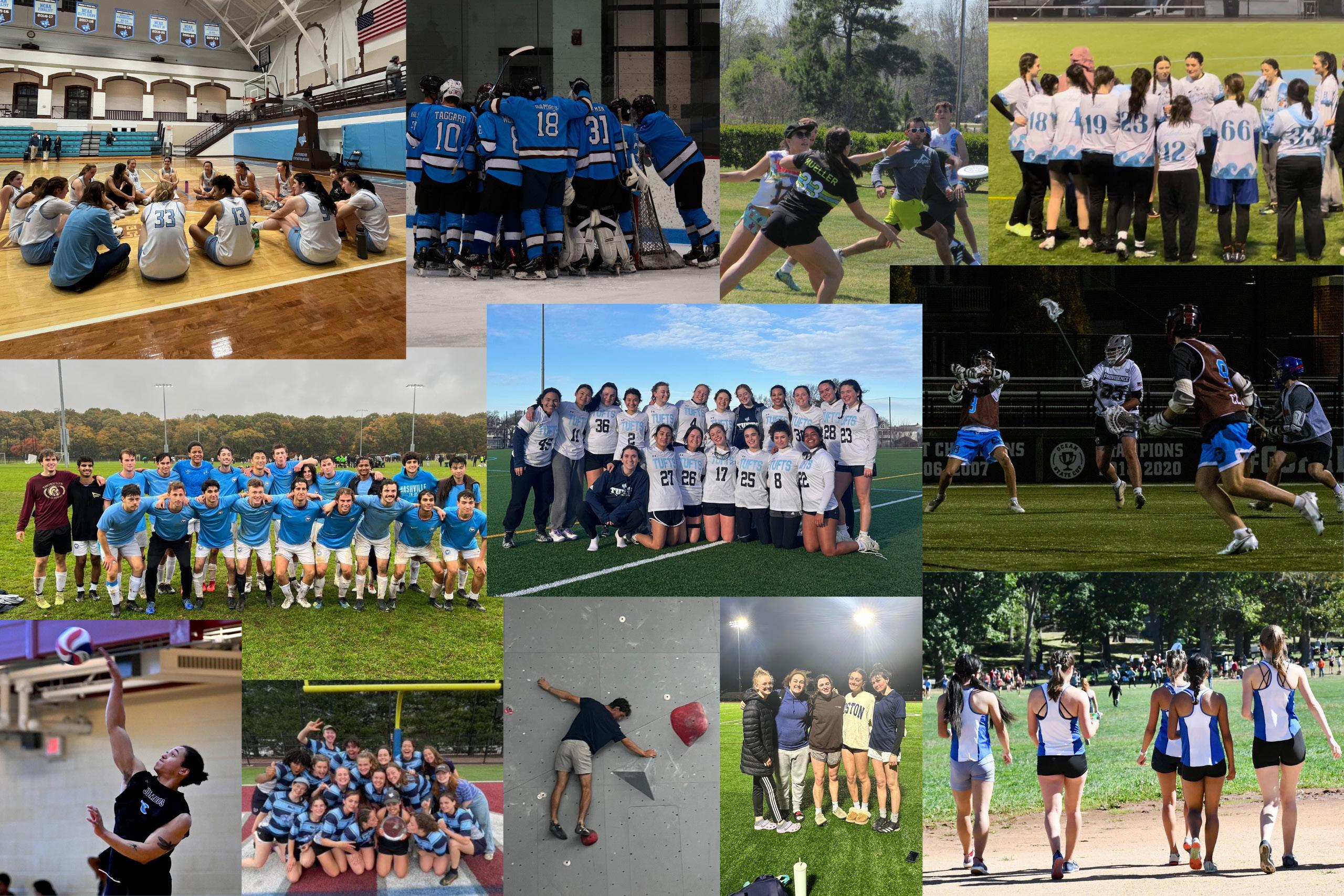

SPORTS 12 THURSDAy, APRIl 11, 2024 THE TUFTS DAILY
TUFTS DAILY SPORTS STAFF






























